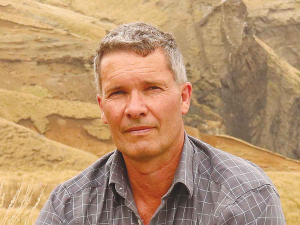Hawke’s Bay sheep and beef farmers warned to monitor stock water wells
Sheep and beef farmers in Hawke's Bay are being urged to keep a close eye on the wells that supply water to their stock.
 Hawke's Bay vet Richard Hilson says, as well as dealing with drought and COVID, farmers are being put under unnecessary pressure by government demands.
Hawke's Bay vet Richard Hilson says, as well as dealing with drought and COVID, farmers are being put under unnecessary pressure by government demands.
Hawke's Bay vet Richard Hilson says the effects of the lockdown with COVID-19 tended to isolate farmers more than people might have imagined.
He says towards the end of Alert Level 4, farmers needed to talk to people – their neighbours and others. He believes many felt they were being backed into a corner, on their own, having to deal with the drought.
Vets, says Hilson, were in a unique position to help farmers in this respect. He says when a vet goes on a farm they usually work with a farmer, unlike someone who comes on to fix a machine. He says vets are people that farmers more likely form a relationship with, chew the fat and have a laugh.
“But right now, half the time it’s talking about animal health and the other half, human health. As a vet you are aware of what other people are going through,” Hilson told Rural News.
“At our staff meeting, I made the point that if people come into the shop and they want to talk to you, please stay with them – don’t fob anyone off – we don’t mind if you spend time with them.
One of my staff said a guy who rang up the other day is someone she would normally only have a 30 second conversation with, but says he was still on the phone after 30 minutes. I said: ‘good on you – you have made his day’. It just goes to show how bad it really is out there,” he says.
Hilson says as well as the drought and COVID, farmers are having to deal with M. bovis and, in parts of the region, an outbreak of TB.
He says the Government has put unnecessary pressure on farmers demanding they apply for consents for the Tukituki catchment scheme. Federated Farmers have already asked Environment Minister David Parker to give them more time to apply for consents because of the drought and COVID, but he has refused.
Hilson says the Government attitude stuns him and warns that stressing farmers like this could have fatal consequences.
Pāmu has welcomed ten new apprentices into its 2026 intake, marking the second year of a scheme designed to equip the next generation of farmers with the skills, knowledge, and experience needed for a thriving career in agriculture.
One team with 43 head, including a contingent from Mid Canterbury, are reflecting on a stellar NZ DairyEvent.
Fonterra farmer shareholders have approved the mechanism for a $2/share capital return expected from the sale of its global consumer and associated businesses.
Trainees in the horticulture industry studying towards a certificate or diploma can now apply for Horticulture New Zealand's (HortNZ) 2026 Industry Training Scholarships programme.
OPINION: The first three Global Dairy Trade (GDT) auctions have been a morale booster for farmers.
Former Fonterra executive Alex Turnbull has been appointed CEO to lead all five Yili Oceania Business Division companies in New Zealand.